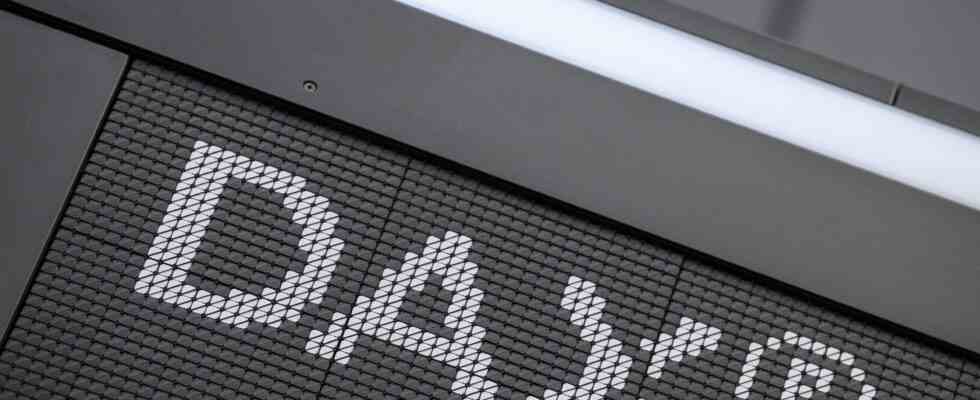Status: 08/22/2022 07:58 a.m
With weak international guidelines in hand, the German stock market is expected to be a little lighter. In the United States in particular, concerns about interest rates and inflation have recently become more of a topic.
According to the first indications, the DAX was struggling at the 13,500 point mark at the start of the week. On Friday, the leading German index closed 1.1 percent lighter at 13,544 points. It does not look as if the DAX could target the 14,000 point mark.
The index is in danger of running out of momentum – this is the verdict of a number of market observers in view of the recently halted recovery rally. After it bounced off the 14,000 mark last week, the signs are now pointing to consolidation,” writes capital market strategist Jürgen Molnar from broker Robomarkets.
Concerns about the economy and inflation are once again dominating the picture, especially as Russia announced before the weekend that it would interrupt gas supplies via the Nord Stream 1 Baltic Sea pipeline for three days at the end of August. That could rekindle concerns about a gas shortage in the winter.
Moderate requirements from Asia
The DAX cannot expect much support from the overseas markets, the targets are mostly weaker. In Japan, the Nikkei index lost around half a percent, and the other Asian markets also tended to be lighter. The exception is China, where prices will rise by between 0.5 and 0.9 percent following the expected interest rate cut by the Chinese central bank.
At the end of the week, Wall Street had gone down significantly after fears of interest rates and inflation resurfaced. Investors then took profits. In particular, the interest-sensitive technology exchange Nasdaq weakened.
China cuts interest rates
China wants to further boost the demand for credit in the economy, which has been hit by the real estate crisis and corona outbreaks, by lowering the key interest rate again. The key one-year lending rate (LPR) was cut five basis points to 3.65 percent at the monthly pricing by the central bank (PBoC), and the five-year key lending rate fell 15 basis points to 4.30 percent. The PBoC last lowered the LPR in January and that for five-year loans in May. The central bank had also recently braced itself against the downturn promoted by the Corona crisis by surprisingly capping other important interest rates.
In the spring, gross domestic product (GDP) increased by a meager 0.4 percent. In particular, the strict government measures to contain the corona pandemic had a negative impact on the economy. It is expected that the government’s growth target of 5.5 percent for this year will not be met – also because the real estate sector is weakening and consumers are holding back on spending.
The euro is struggling with parity
The euro’s recent bout of weakness continues in the morning. In early trading, one euro is priced at $1.0037. As a result, the euro threatens to fall below parity with the dollar. Experts speak of parity when the exchange rate of two currencies is exactly the same. The dollar recently benefited from increased speculation that the US Federal Reserve (Fed) would raise interest rates again by 75 basis points in September.
Fresenius in focus
Investors are now looking towards Fresenius for individual stocks in the DAX. After turbulent times, a new man is to lead the Bad Homburg medical and hospital group out of the permanent crisis. Effective October 1, 2022, the Supervisory Board appointed the acting boss of the Fresenius subsidiary Kabi, Michael Sen, as CEO.
The change in personnel does not come as a complete surprise: after repeated profit warnings in recent years, the outgoing CEO Stephan Sturm had only recently had to trim the targets for the current year. This was probably the last straw for the supervisory board, which had remained loyal to Sturm despite ongoing problems. The manager is leaving the company “on good terms,” it said.
Hötttges still has big plans for the T-Share
According to the goal of CEO Timotheus Höttges, Telekom is to become the most valuable German stock exchange company in the foreseeable future and overtake the software group SAP. “My claim is that Telekom should become the most valuable company in Germany,” Höttges told the Augsburger Allgemeine newspaper.
The group is already hot on the heels of the number two leader SAP. Business is good. Höttges pointed out that Telekom recently increased its profit forecast to 37 billion euros before taxes, interest and depreciation. The company’s image has also changed. He is often asked about the good service. “And how successfully we have developed from a public authority to a modern company.” Telekom is an example of successful privatization.
Ford has to pay a $1.7 billion fine
According to a media report, a US court has ordered the automaker to pay $1.7 billion after a fatal accident. Ford is accused of not having strengthened the roof of the F-250 pickup truck model sufficiently to protect the occupants in a rollover accident.
New staff at Credit Suisse
The new Credit Suisse CEO Ulrich Körner has made the first important personnel decisions. Dixit Joshi will become chief financial officer of the major Swiss bank on October 1st, the Deutsche Bank competitor announced. Joshi was most recently a Treasurer at Deutsche Bank Group for five years, where he played a key role in restructuring the bank and its balance sheet. Credit Suisse also announced that Francesca McDonagh, originally slated to lead its Europe, Middle East and Africa business, will become Group Chief Operating Officer effective September 19.

